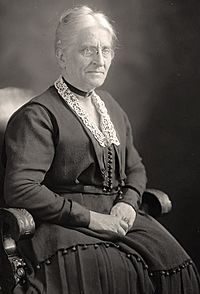Clara Southmayd Ludlow facts for kids
Quick facts for kids
Clara Southmayd Ludlow
|
|
|---|---|

Dr. Clara Southmayd Ludlow, around 1920
|
|
| Born | 26 December 1852 Easton, Pennsylvania, U.S.
|
| Died | 28 September 1924 (aged 71) Washington, D.C., U.S.
|
| Nationality | American |
| Citizenship | United States |
| Alma mater | B.S., M.A., Mississippi State University, Ph.D. George Washington University |
| Years active | 1889-1924 |
| Known for | Scientist, Entomologist |
| Parent(s) | Jacob Rapalje Ludlow, Anna Mary Hunt |
Dr. Clara Southmayd Ludlow (1852–1924) was an American scientist who studied insects, especially mosquitoes. She was the first woman known to write many important papers about different types of mosquitoes. She also studied how mosquitoes spread diseases.
Dr. Ludlow had a remarkable career in a field called medical entomology. This field focuses on insects that affect human health. She worked at a time when very few women were entomologists, and even fewer worked with the military. Her work with the military was especially rare for a woman back then.
Contents
Early Life and Music Career
Clara Southmayd Ludlow was born on December 26, 1852, in Easton, Pennsylvania. She was the oldest child of Jacob Rapalje and Anna Mary Ludlow. Her childhood was greatly affected by the American Civil War. During the war, her father served as a surgeon in the United States Army.
In 1877, Clara began studying at the New England Conservatory of Music. She graduated in 1879. By 1880, she was working as a music teacher at the Monticello Female Seminary in Illinois. She taught music and performed concerts for many years. Around 1889, she started to become interested in science.
Becoming a Scientist
By 1897, Clara Ludlow was a student at Mississippi Agricultural & Mechanical College. This school is now known as Mississippi State University. She earned her Bachelor of Science degree in Agriculture in 1900. In 1901, she received her Master of Arts degree in Botany from the same university. This was quite special, as the school didn't officially have a graduate program until much later.
After getting her Master's degree in 1901, Ludlow traveled to Manila, Philippines. She went to visit her brother, who was an army officer stationed there. She returned to the United States about a year later with her brother, who had become ill. During her time in Manila, she started working with military medicine. This connection would last for the rest of her life.
Studying Mosquitoes and Diseases
In 1904, Dr. Ludlow became a lecturer at the Army Medical Museum in Washington, D.C. She taught about mosquitoes and the diseases they carry. By 1907, she was teaching at George Washington University in Washington, D.C. There, she studied Histology (the study of tissues) and Embryology (the study of how living things develop).
She earned her Doctor of Philosophy (Ph.D.) degree in 1908. Her Ph.D. paper was about "The Mosquitoes of the Philippine Islands." It focused on where certain mosquito types lived and how they related to specific diseases. She continued to teach at George Washington University until 1909.
From 1916 to 1920, she worked as an Anatomist at the Army Medical Museum. Her research there focused on identifying different types of mosquitoes. She also worked on a project using mosquito samples sent from military bases. This led to a museum film called "Mosquito Eradication" in 1918. In 1920, she became the museum's Chief Entomologist. She held this important position until she passed away.
Death and Legacy
Clara Ludlow died on September 28, 1924, in Washington, D.C. She is buried in Arlington National Cemetery, next to her father.
Honors and Recognition
In 1908, Dr. Ludlow was chosen to be a member of the American Society of Tropical Medicine. She was the first woman and the first non-physician scientist to join this society. This was a big achievement, showing how important her work was.
For a long time, her amazing achievements were not fully recognized. This might have been because of the challenges women faced in science during the early 1900s.
However, in 2017, the American Society of Tropical Medicine and Hygiene created a special award named after Dr. Ludlow. This medal honors people who show an "inspirational and pioneering spirit." It recognizes those whose work in tropical medicine has succeeded despite obstacles. This award helps to remember Dr. Ludlow as a true pioneer in her field.
 | Jessica Watkins |
 | Robert Henry Lawrence Jr. |
 | Mae Jemison |
 | Sian Proctor |
 | Guion Bluford |

